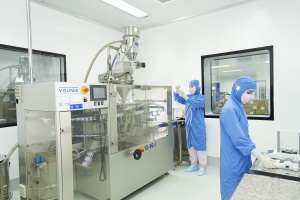Is pharmaceutical market benefiting from EVFTA?
The EVFTA came into effect in August 2020, causing Vietnam’s pharmaceutical import rate from the EU to steadily climb upward, evidently shown by an increase of 15.4 per cent in 2021 in comparison to 2020.
 |
| Duong Thi Mai Hoa, managing partner, I-V Legal |
In 2024, pharma imports were calculated to reach nearly $4.4 billion, resulting in a 27.9 per cent increase compared to 2023, with major imports from France, Germany, and other countries.
The introduction of the deal has certainly raised the stakes between Vietnamese and EU pharmaceutical businesses. Under its commitments, EU companies are allowed to establish foreign-invested enterprises in Vietnam. These enterprises are not only permitted to conduct clinical research and pharma testing in accordance with Vietnamese law, but they can also import pharmaceuticals approved for circulation here, build warehouses to store imported drugs, and sell drugs to authorised distributors or wholesalers, whereas direct distribution of products to end users is currently limited by the laws.
As a result, domestic manufacturers and distributors face competitive pressure from EU enterprises, especially for proprietary and specialised drugs (patent medicine) that are still under patent protection and have not yet been produced in Vietnam. This may be a direct result from the EVFTA having effectively eliminated nearly all tariff barriers for pharmaceuticals, making it easier and more direct to import EU products here.
Vietnam has also committed to stronger intellectual property protections for pharmaceuticals, including commitments on compensating for delays and protecting exclusive data, making it harder for drugs to become generics and thus reducing the likelihood of price drops. However, this also provides an advantage for Vietnamese businesses, which can access high-quality raw materials at competitive prices, while consumers benefit from the opportunity to use the EU’s high-quality pharmaceuticals.
The challenges posed by the commitments under the EVFTA are also opportunities for Vietnamese pharma companies to seek development strategies and enhance their competitive advantages. One notable example is the race among reputable domestic pharmaceutical companies to develop EU-GMP-standard manufacturing plants.
Products meeting EU-GMP or equivalent standards will have high quality, elevating the brand value of companies, increasing domestic sales, and contributing to higher export rates of Vietnamese pharmaceuticals to the EU market. Currently, 25 out of 240 pharma manufacturing plants in this country have met one of the high GMP standards.
Additionally, some Vietnamese companies are shifting their focus to developing domestic distribution channels to expand supply, ensuring reputable, high-quality, timely, and convenient distribution for patients. Strengthening business cooperation and distribution support between Vietnamese and EU pharma companies and parent companies in the EU for the Vietnamese market is also among their key focuses.
For EU companies, besides focusing on exporting to Vietnam through overseas funding, they are also increasing investment by establishing branches, expanding manufacturing facilities, and seeking distribution partners. They are encouraging the development of high-quality, safe, effective, and environmentally friendly research and development to meet the needs of Vietnam’s market.
Overall, the procedures for drug registration and import licensing have been largely made more transparent and simplified. Since the EVFTA took effect, Vietnam has been adjusting various legal documents essential for the development of its pharmaceutical sector to institutionalise and implement its commitments. These adjustments include issuing documents to address difficulties in drug registration over the past few years.
To adjust the highest legal framework, thus creating a practical and effective legal corridor for the sector, a new law will replace the 2016 Pharmaceutical Law. This new law shall take effect starting from July, introducing several new provisions.
They include establishing a legal framework for new business models, specifically recognising pharmacy chain organisations as a separate type of business establishment. It defines business conditions, rights, and responsibilities of pharmacy chain organisations and individual pharmacies within the chain, notably the rights to transfer drugs and professional personnel between pharmacies in the chain.
The e-commerce business of pharmaceuticals and ingredients will be regulated by specifying electronic platforms, types, and ingredients permitted for e-commerce. It also clarifies the rights and responsibilities of such businesses engaged in e-commerce.
Rights and responsibilities of foreign-invested businesses will be clarified within the law to ensure transparency in state management, and administrative reforms in drug and ingredient registration procedures will be enhanced.
However, to boost competitiveness, Vietnam needs to continue improving investment incentives, supporting domestic research and production, and establishing mechanisms to assist local businesses in meeting international standards.
Vietnamese pharmaceutical companies should take advantage of tariff barriers being lifted to increase the export of high-quality products to the EU market. Secondly, strengthening technology transfer and research cooperation to expand production capacity in Vietnam should also be made a priority in the near future.
However, aside from intense competition from large pharmaceutical companies operating in this country and increasing requirements for quality, safety, and intellectual property protection from the EU, Vietnamese companies, especially pharmaceutical businesses, will be affected by the government’s organisational streamlining and policy adjustments, leading to delays in implementing new regulations. This will require Vietnamese businesses to have the capacity to quickly adapt to domestic and international legal changes.
 | Stimulating year ahead for pharma Vietnam’s pharmaceutical market is expected to have a year of optimism after experiencing a multicoloured gamut in 2024. |
 | Vietnam accelerates in high-tech pharmaceutical race Vietnamese pharmaceutical companies are well-positioned to seize long-term growth opportunities in the advanced pharmaceutical market segment. |
What the stars mean:
★ Poor ★ ★ Promising ★★★ Good ★★★★ Very good ★★★★★ Exceptional
Related Contents
Latest News
More News
- Masan Consumer names new deputy CEO to drive foods and beverages growth (February 23, 2026 | 20:52)
- Myriad risks ahead, but ones Vietnam can confront (February 20, 2026 | 15:02)
- Vietnam making the leap into AI and semiconductors (February 20, 2026 | 09:37)
- Funding must be activated for semiconductor success (February 20, 2026 | 09:20)
- Resilience as new benchmark for smarter infrastructure (February 19, 2026 | 20:35)
- A golden time to shine within ASEAN (February 19, 2026 | 20:22)
- Vietnam’s pivotal year for advancing sustainability (February 19, 2026 | 08:44)
- Strengthening the core role of industry and trade (February 19, 2026 | 08:35)
- Future orientations for healthcare improvements (February 19, 2026 | 08:29)
- Infrastructure orientations suitable for a new chapter (February 19, 2026 | 08:15)

 Tag:
Tag:



















 Mobile Version
Mobile Version